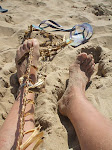
Is now open to the public at Walford Mill in Dorset and will be so until the evening of the 24th October so there are only four weeks left in which it can be seen in the south of England. We then have a gap in the schedule before it moves on to Denbigh Library Gallery in North Wales where it opens on the 15th January so if you run a gallery or an exhibition space and would like to have the show for the pre Christmas slot please get in touch with Christine Fletcher Jones, christine@walfordmillcrafts.co.uk as soon as possible.
There is a 60 page colour catalogue to accompany the exhibition which can be ordered by mail from Walford Mill. The details of how to do this are on this link http://www.walfordmillcrafts.co.uk/current.htm

Last week the exhibition was visited by a group of 50 mayors from all over Dorset (playfully referred to as the 'chain gang' by someone who will remain anonymous). Many of these mayors were not aware of the work that is done at Walford Mill and were apparently delighted with what they saw which can only be good news because like most other arts organisations in Britain, at the moment, Walford Mill Crafts is fearful about the projected cuts in public spending.
There has also been a political proposal that the arts should operate like commercial businesses and survive on their "profits" without tax payers help. In which case the only people who would be able to afford to participate in the arts would of necessity have to be middle aged, in work and rich as ticket, entry, participation fees etc would all have to go up and private enterprises do not normally subsidise the young, old or unwaged to attend events! The only arts events staged would be those that could be certain to bring in punters and the vision of endless re-runs of "Les Miserables" and non stop Constable exhibitions without the option of anything new or daring or different is just too horrible to contemplate. Removing public sponsorhip for the arts would be to abandon the next generation to a cultural life determined by the profit making organisations that dominate the virtual world.
It would not have been possible for me to do what I do without opportunities to show my work and teach classes in publicly funded venues in Britain and in many other countries and although my personal history is not important in the greater scheme of things, there are thousands of other artists/craftspeople/musicians/actors and authors who have also been supported in some small way or another by tax payers and most of them in return will have enriched many other lives by doing what they do.
Today there is a photography event taking place in a small village called Barro in France http://barrobjectif.canalblog.com/ that attracts thousands of visitors who pay nothing to enter. It has been running for 10 years and is there for everyone that wants to see it. It is a prime example of the type of event that could not function without public money and it is superb.

It has enriched my life by showing me other ways to view the world in which we live, but I really wonder if I would have been prepared to pay to see it if I had never seen it before and didn't know just how good it is.






